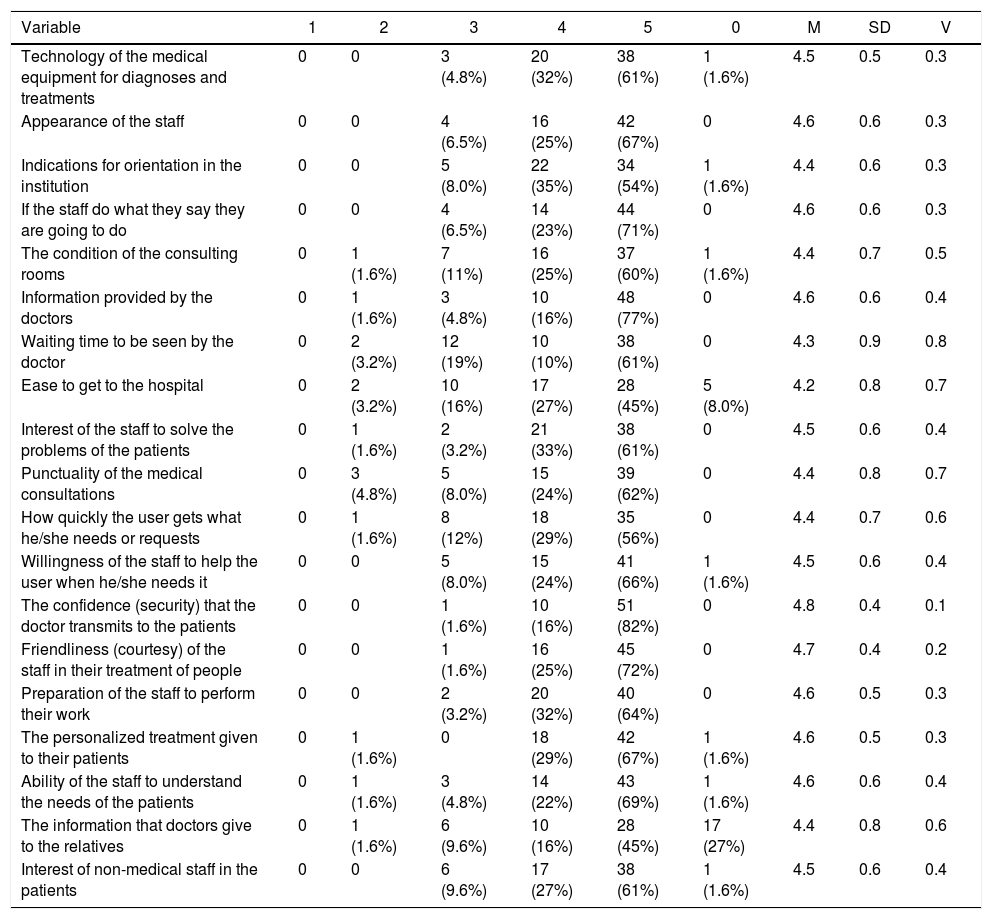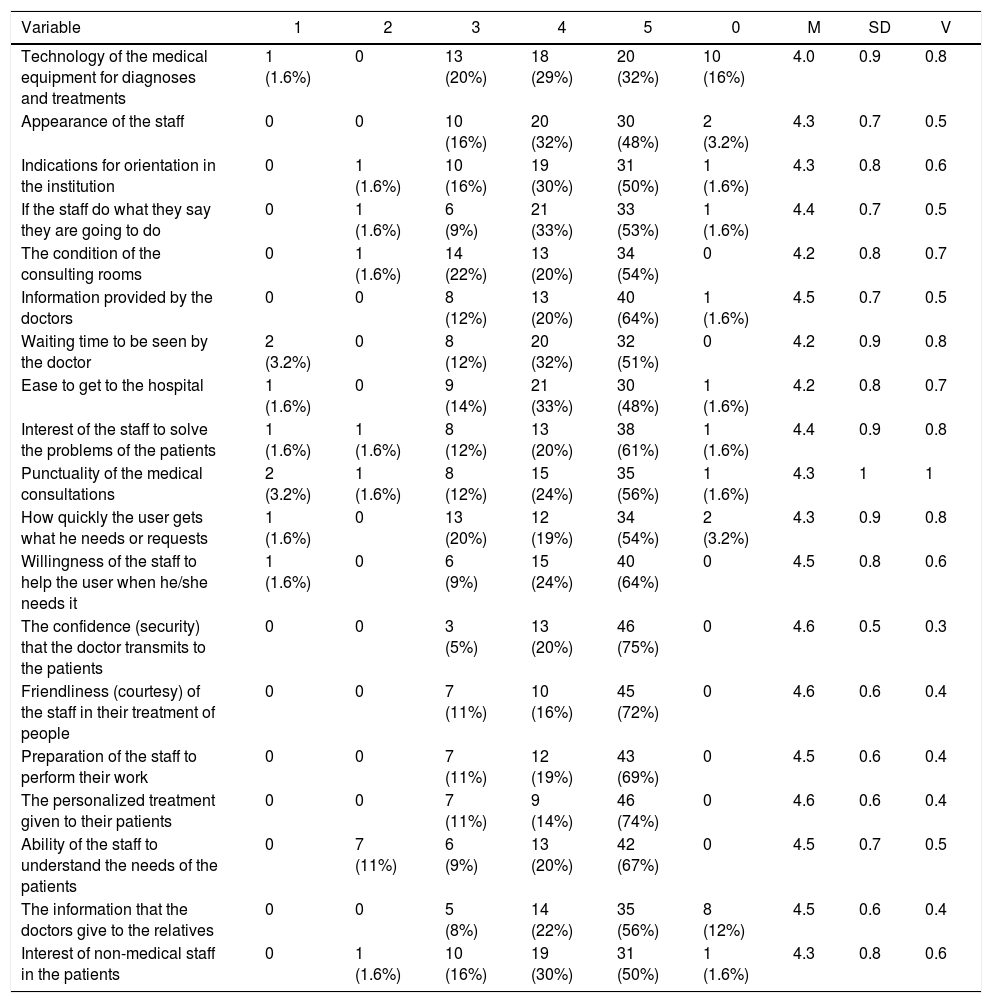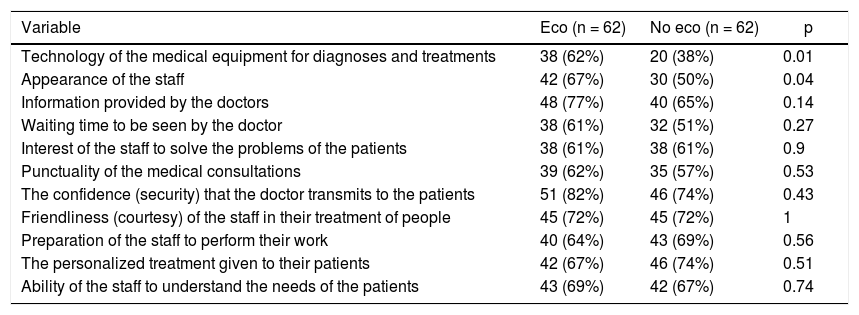Ultrasound has shown its usefulness in multiple aspects in the management of inflammatory joint disease and in particular of rheumatoid arthritis (RA). The evidence using patient outcomes and its aspects related to quality of health care is scarce. The aim of this study is to determine the level of satisfaction in the perception of the quality of health care in a group of patients with RA who underwent ultrasound during the consultation, and whether it is higher than those who did not have the ultrasound.
MethodsAn observational, cross-sectional descriptive study was performed. Patients older than 18 years with a diagnosis of RA using the ACR/EULAR classification criteria were included. One group underwent skeletal muscle ultrasound to study RA during the outpatient medical consultation, as decided by the attending physician. After the completion of the medical action according to prior verbal acceptance by the patient, the Servqhos questionnaire and an ultrasound questionnaire were completed. A satisfied patient was defined as one who had 70% or more in the responses in the Servqhos questionnaire greater than or equal to 4, and a score of 5 in this questionnaire was defined as maximum satisfaction. There were no significant differences between the number of satisfied patients in the two groups. Univariate analysis was performed according to the distribution in the ultrasound or non-performing groups. Subsequently, a bivariate analysis of the different questions was carried out according to the distribution in the satisfaction and very high satisfaction groups. It was established if there was any degree of association using the Chi squared test for categorical variables, and the parametric tests (Mann Whitney U) or non-parametric tests (Kruskal-Wallis test) for the numerical variables were performed according to the distribution.
ResultsA total of 126 patients were obtained, of whom 62 corresponded to the group of patients who underwent ultrasound during the consultation and 62 to the control group in whom no ultrasound was performed. The majority were women (91%). Ultrasound was mostly performed to study joint disease (93%), with a third of the time to assess more than one aspect. In those on whom the ultrasound was performed, the number of satisfied patients was 56 (90%) and for the control group it was 48 (77%). The difference in the proportion of satisfied patients (13%) was statistically significant (P = .05). A difference was found between the groups in the number of patients with the highest level of satisfaction in the questions regarding presentation of staff and technology (P < .05). The vast majority of patients considered that ultrasound was useful during the consultation (93%), and that it generates greater confidence in the treatments and the doctor (93%).
ConclusionsPerforming skeletal muscle ultrasound during consultation in patients with RA improves satisfaction rates of health care, perception of the doctor, and treatments.
La ecografía ha mostrado su utilidad en múltiples aspectos del manejo de la enfermedad articular inflamatoria, particularmente en la artritis reumatoide (AR). Su utilidad usando desenlaces derivados de pacientes y relacionados con aspectos de la calidad de la atención en salud es escasa. El objetivo del estudio es determinar si el grado de satisfacción de la calidad de la atención en un grupo de pacientes con AR, en quienes se realizó ecografía durante la consulta, es superior al de un grupo en los que esta no se llevó a cabo.
MétodosSe realizó un estudio observacional, descriptivo transversal. Se incluyeron pacientes mayores de 18 años con diagnóstico de AR por criterios clasificatorios ACR/EULAR que posteriormente a la finalización del acto médico respondieron las preguntas del cuestionario Servqhos. Quienes se sometieron a ecografía musculoesquelética para estudio de AR durante la consulta ambulatoria, según decisión del médico tratante, respondieron adicionalmente el cuestionario de ecografía. Se define paciente satisfecho como aquel que tiene un 70% o más en las respuestas del cuestionario Servqhos con un puntaje mayor o igual a 4, y se define como la máxima satisfacción al puntaje de 5 en una pregunta de dicho cuestionario. Se determinó si había diferencias significativas entre las proporciones de pacientes satisfechos en los dos grupos con y sin ecografía. Se realizó un análisis univariado según la distribución en los grupos, y posteriormente se hizo un análisis bivariado de las diferentes preguntas según la distribución en los grupos de satisfacción y muy alta satisfacción. Se estableció si había algún grado de asociación con las pruebas de chi-cuadrado para las variables categóricas, en tanto que para las variables numéricas se llevaron a cabo pruebas paramétricas (U de Mann Whitnney) y no paramétricas (test de Kruskal-Wallis), según la distribución.
ResultadosSe obtuvo un total de 126 pacientes, de los cuales 62 corresponden al grupo de aquellos en quienes se realizó ecografía durante la consulta, mientras que otros 62 hacen parte del grupo control, en quienes no se realizó ecografía. La mayoría eran mujeres (91%). En quienes se hizo la ecografía, el número de pacientes satisfechos fue de 56 (90%), en tanto que para el grupo control fue de 48 (77%). La diferencia en la proporción de pacientes satisfechos entre los grupos fue del 13%, siendo estadísticamente significativa (p = 0,05). Se encontró diferencia entre los grupos en las preguntas referentes a presentación del personal y la tecnología de los equipos (p < 0,05). La gran mayoría de los pacientes consideró que la ecografía fue útil durante la consulta (93%) y que genera mayor seguridad en los tratamientos y en el criterio médico (93%).
ConclusionesLa realización de ecografía musculoesquelética durante la consulta en pacientes con AR mejora los índices de satisfacción de atención en salud, así como la percepción del criterio médico y de los tratamientos.









